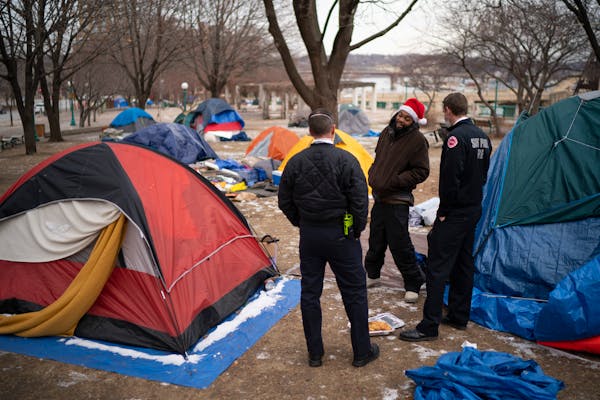St. Paul Police Chief Todd Axtell is urging Mayor Melvin Carter to raise officer wages or risk losing members of the already depleted force to other Minnesota agencies.
In a Feb. 4 letter to Carter, Axtell wrote that the St. Paul Police Department has "seen our capacity to connect with the community, engage in innovative crime prevention efforts and give victims the attention they deserve diminish" as an increasing number of officers retire or leave the force for other jobs.
"My fear is that if we can't compete with other agencies, we'll continue to see the unraveling of what is and has been a premier law enforcement destination agency," wrote Axtell, who in the fall announced that he will not seek reappointment once his term expires in June.
In an interview Friday, Carter said the department is experiencing the same labor trends that large employers across the country are facing in the wake of a global pandemic that's prompted a wave of retirements and career changes.
The department, which is authorized to have up to 619 sworn officers, currently has 542, according to police spokeswoman Sgt. Natalie Davis.
Fifty-five cadets will graduate St. Paul's police academy soon and be eligible for full-fledged patrol duties in June. Carter said the city plans to make a second round of hires for an academy that would start this spring, though he does not yet know how large that training class will be.
"We've got help on the way already," the mayor said. "We're not asking officers to continue to stretch the way that they're stretching today."
Mark Ross, president of the St. Paul Police Federation, said the union on Thursday filed its final position for arbitration of its labor contract. Other city unions have approved agreements that increased wages 1% in 2021 and 2.5% over the course of 2022.
Ross said St. Paul has for years been falling behind other Twin Cities-area police agencies — many of which are in the suburbs — that have boosted compensation to attract officers from a shrinking candidate pool. Axtell wrote that Maple Grove recently agreed to a three-year contract with officers that increases wages by 3% annually and includes a 10% market adjustment, while the Legislature also enacted a substantial pay raise for state troopers.
"As the pay gap widens and the stresses and the scrutiny of the job increase, more people are going to go," Ross said. "Right now we're in a place where we're not quite in crisis mode — but we are approaching it quickly."
A record 38 homicides occurred in St. Paul last year, as cities across the country grappled with a spike in violent crime during the pandemic.
"The reality is there's no reason to think that we won't break the record for homicides again this year and that there won't be more shots fired this year than last year," Ross said.
Carter rejected that argument, saying: "We don't have homicides because we're short officers. We have homicides because we need to invest in our community more. That's why we are seeking to fully fund what we think of as a comprehensive and more proactive approach to public safety — that gets us beyond just saying we need as many people as we can to rush to the scene of an emergency as soon as possible after something terrible happens."
Those efforts include the city's homelessness response team and a new program that will aim to pair social advocates with first responders, the mayor said.
"Part of what we're doing is taking some of that weight off of our officers' shoulders in a way that will hopefully allow our officers to focus on carjackings and shootings and the most serious crimes that we experience in our community," he said.
Axtell has clashed with Carter over budget and staffing matters over the course of his tenure. Since his October announcement of his plans to step down, he has also raised questions about the mayor's vaccine mandate for city employees and his handling of St. Paul's rent control ordinance.

Want to share info with the Star Tribune? How to do it securely

'Safe recovery sites' would offer syringes, naloxone and more to people using drugs. The plan could be in peril.
New Minnesota GOP leaders seek peace with party's anti-establishment wing

Who is Republican Lisa Demuth, Minnesota's first House speaker of color?

